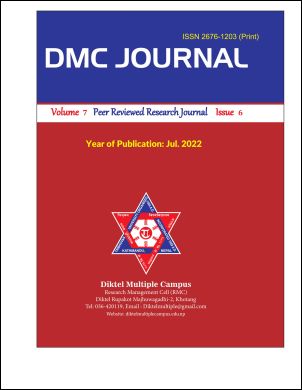A review of principles of management's history and contemporary perspective in brief
DOI:
https://doi.org/10.3126/dmcj.v7i6.57509Keywords:
Management theory, principle, perspective, efficiency, productivityAbstract
Management is a crucial phenomenon in the modern business age. Management is an important instrument for the managers. Though, managers used to apply emerging theories and principles to be wonderful success beyond the enhancing organization’s productivity and gaining more profit. Since ancient period, accompanying with human civilization. Million scholars are thinking, studying and experimenting for effective principles of management till now and still they have been continuing it.
Furthermore, this study reviews that the history of management, evolution of management thought, trends of scholars contributions in different time period from the antiquity.
In the 18th century, during the industrial revolution has been changed tremendously in management perspectives. Management scholars, experts have had developed some classical theory, human relation theory, Human behavior science theory, management science theory, system theory, and contingency theory. Scientists, mathematicians, economists, sociologists, psychologists are still research experimenting and inventing contemporary management theories of management.
This is the scientific era, world is influencing with dynamic environment. The technology, economic, social, culture, political, legal etc. are changing continuously. Thus, a manage must take crucial challenges in working environment in the organization. Hence, the manager should be consider on changing perspective of management principles. Principles of management provide suitable guidelines for a manager. Moreover, if managers follow strictly principles of management, definitely it supports to enhance efficiency of employees' and increased productivity. An organization’s success and failure depends on effective management. Whether a successful management can drastically change in society and nation through economically and social paradigm.




